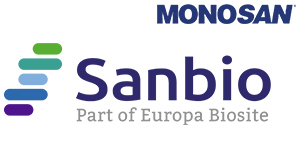Rat anti-mouse TNF-RI (p55/p60), clone HM104 (Monoclonal)
Rat anti-mouse TNF-RI (p55/p60), clone HM104 (Monoclonal)
Artikelnummer
SANMON9064
Verpackungseinheit
1 ml
Hersteller
Sanbio / Monosan
Verfügbarkeit:
wird geladen...
Preis wird geladen...
Clone Number: HM104
Immunogen: Unknown or proprietery to MONOSAN and/or its suppliers
Concentration: 100 ug/ml
Storage buffer: PBS with 0.1% BSA and 0.02% sodium azide
Additional info: The monoclonal antibody HM104 recognizes the extracellular part of the Tumor Necrosis Factor Receptor type I (TNF-RI) of the membrane-bound as well as the soluble receptor. TNF-RI (~55-60 kDa) is present on most cell types and is considered to play a prominent role in cell stimulation by TNF-alpha. TNF-alpha activates inflammatory responses, induces apoptosis, regulates cellular proliferation, and may even promote cancer progression. The effects of TNF-alpha are mediated by TNF-RI and TNF-RII, which have both distinct and overlapping downstream signaling cascades. Induction of cytotoxicity and other functions are mediated largely via TNF-RI. TNF-RI is equally well activated by both the 17 kDa soluble and 26 kDa membrane-bound form, whereas TNF-RII is efficiently activated only by the membrane bound form of TNF-alpha. TNF-RI signaling is initiated when trimeric TNF-alpha binds TNF-RI receptors. Subsequent TNF-RI trimerization promotes the recruitment of a proximal signaling complex composed of TNF Receptor Associated protein with a Death Domain (TRADD), Receptor Interacting Protein (RIP), cellular Inhibitor of Apoptosis Protein 1 (cIAP1), TNF Receptor Associated Factor 2 (TRAF2), and likely TRAF5. Studies with TNF-RI-deficient mice indicate that TNF-RI mediates most of the proliferation, pro-inflammatory, and apoptosis-activating pathways.
References: Bigini et al. Methods Mol Med 2004;98:73/Mennini et al. Cytokine 2004;25:127/Ghezzi et al. Methods Mol Med 2004;98:1
Immunogen: Unknown or proprietery to MONOSAN and/or its suppliers
Concentration: 100 ug/ml
Storage buffer: PBS with 0.1% BSA and 0.02% sodium azide
Additional info: The monoclonal antibody HM104 recognizes the extracellular part of the Tumor Necrosis Factor Receptor type I (TNF-RI) of the membrane-bound as well as the soluble receptor. TNF-RI (~55-60 kDa) is present on most cell types and is considered to play a prominent role in cell stimulation by TNF-alpha. TNF-alpha activates inflammatory responses, induces apoptosis, regulates cellular proliferation, and may even promote cancer progression. The effects of TNF-alpha are mediated by TNF-RI and TNF-RII, which have both distinct and overlapping downstream signaling cascades. Induction of cytotoxicity and other functions are mediated largely via TNF-RI. TNF-RI is equally well activated by both the 17 kDa soluble and 26 kDa membrane-bound form, whereas TNF-RII is efficiently activated only by the membrane bound form of TNF-alpha. TNF-RI signaling is initiated when trimeric TNF-alpha binds TNF-RI receptors. Subsequent TNF-RI trimerization promotes the recruitment of a proximal signaling complex composed of TNF Receptor Associated protein with a Death Domain (TRADD), Receptor Interacting Protein (RIP), cellular Inhibitor of Apoptosis Protein 1 (cIAP1), TNF Receptor Associated Factor 2 (TRAF2), and likely TRAF5. Studies with TNF-RI-deficient mice indicate that TNF-RI mediates most of the proliferation, pro-inflammatory, and apoptosis-activating pathways.
References: Bigini et al. Methods Mol Med 2004;98:73/Mennini et al. Cytokine 2004;25:127/Ghezzi et al. Methods Mol Med 2004;98:1
| Artikelnummer | SANMON9064 |
|---|---|
| Hersteller | Sanbio / Monosan |
| Hersteller Artikelnummer | MON9064 |
| Verpackungseinheit | 1 ml |
| Mengeneinheit | STK |
| Reaktivität | Mouse (Murine) |
| Klonalität | Monoclonal |
| Methode | Immunohistochemistry (frozen), Immunoprecipitation, ELISA, Flow Cytometry |
| Isotyp | IgG2a |
| Wirt | Rat |
| Konjugat | Unconjugated |
| Produktinformation (PDF) | Download |
| MSDS (PDF) |
|

 English
English







